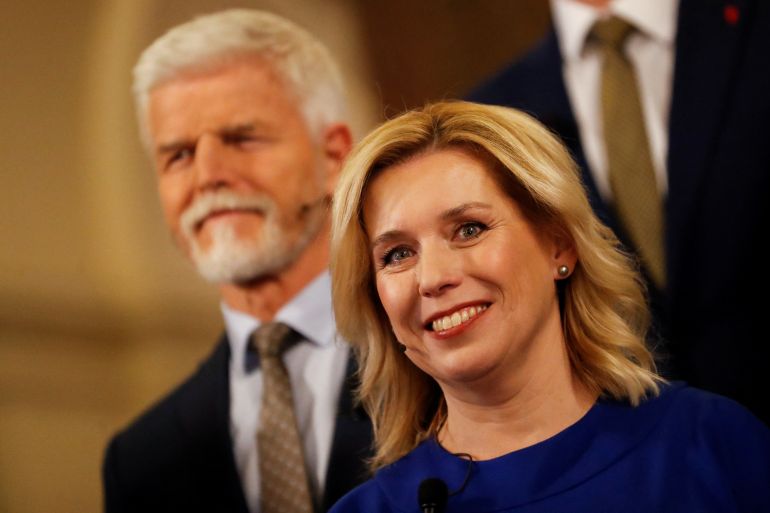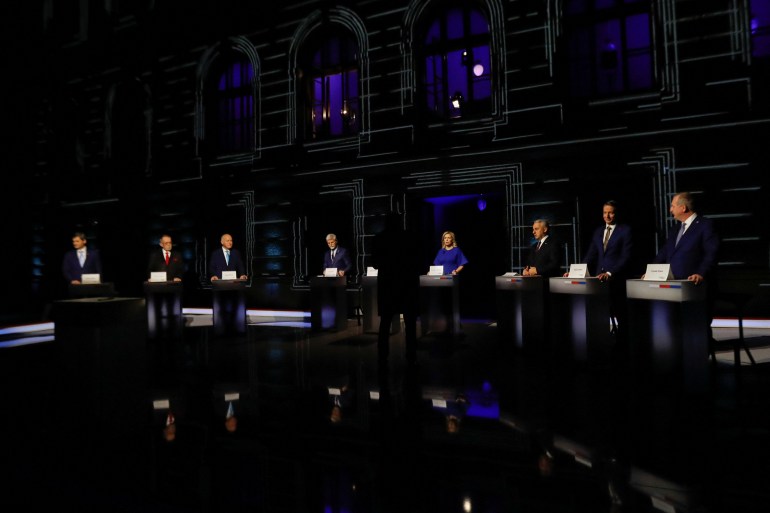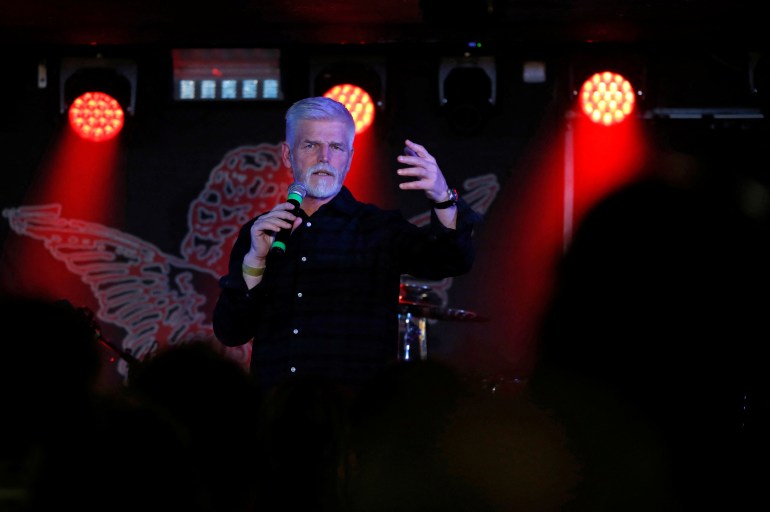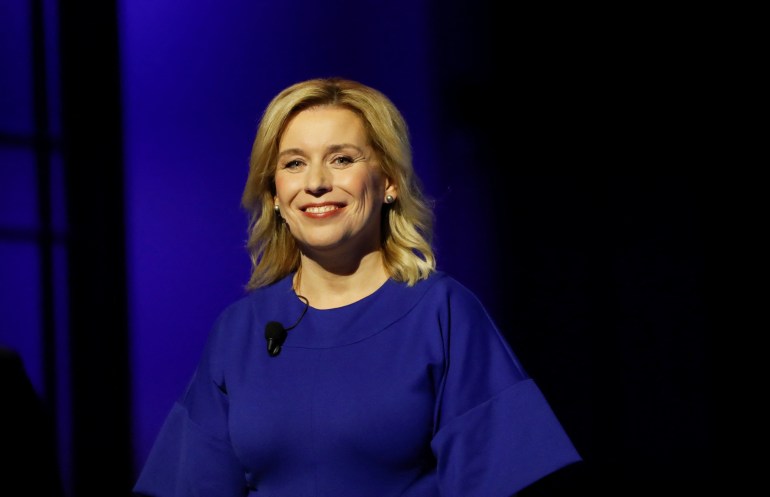Czech presidential election: What you need to know
Eight candidates hope to replace Milos Zeman, who has been criticised for overstepping his role.

Prague, Czech Republic – Presidential polls begin in the Czech Republic on Friday, with voters choosing the next head of state.
The first round includes eight candidates bidding to run the country for the next five years, and ends Saturday.
Keep reading
list of 4 itemsCzech ex-PM Babis, his aide indicted in EU subsidy fraud case
Czech politicians strip ex-PM Babis of immunity over EU fraud
New centre-right government takes office in Czech Republic
No candidate is expected to win a majority and a second round, expected two weeks later, will see the top two candidates compete.
“What makes these elections extraordinary is that none of the candidates represents the three-party governing coalition,” political analyst Jan Herzmann told Al Jazeera. “It is a battle among opposition parliamentary candidates.”
That no candidate represents the current government is “unheard of in the Central European context”, said Herzmann.
The winner will replace outgoing president, Milos Zeman, who is said to have overstepped his constitutional rights several times.
The 78-year-old has been in power since 2013, having served two five-year terms.
He has come under fire for intervening in Czech politics, seeking to improve relations with China and Russia until the Ukraine war erupted, and for his frequent anti-refugee and anti-Muslim comments.
“The Czech president has similar rights to the president of Austria or Germany in that their role is rather formal,” Herzmann said. “This stands in contrast to countries like France where the president is de facto head of government.
“But Zeman had gone beyond his constitutional power numerous times by being overly involved in politics. He made himself more visible than previous presidents. Now it is up to the new head of state whether they will continue in Zeman’s footsteps or respect their role as defined by the constitution.”
Former PM Babiš acquitted ahead of vote
One of the three leading candidates is former Prime Minister Andrej Babiš, the Czech billionaire tycoon who faced trial as the main suspect in a subsidy fraud case just four days before the vote.
Babiš, 68, was acquitted by Prague’s municipal court on Monday in a major win for one of the country’s richest men. He was accused of hiding his ownership in a company to secure 2 million euros ($2.2m) in European Union subsidies to build a conference centre near Prague.
According to Herzmann, the court’s decision could have a significant impact on the presidential race.
“Babiš’s opposition candidates were counting on using the trial as the main argument as to why he should not be elected,” the analyst said. “But since he is no longer facing criminal charges, this is no longer relevant. Whether Czechs will believe Babiš’s version of why he stood trial, that he has become some form of a political victim, remains to be seen.”

He said the verdict, along with last week’s withdrawal of another candidate, trade union activist Josef Stredula, could boost Babiš’s popularity by 3 to 4 percent.
Babiš is expected to secure 26.5 percent of the votes, says the Median market research agency.
“The final results depend largely on public attitudes surrounding the court case and Babiš’s persona,” Herzmannn said. “This is hard to predict as public opinion is based on emotions more than facts.
“The court’s favourable decision towards Babiš could help him gather votes from undecided voters.”
No clean slates
Babiš is not the only controversial candidate.
The other two front runners are both polling at about 27 percent and also face criticism over their past.
An independent candidate, Petr Pavel is the former chairman of the NATO Military Committee and former chief of the General Staff of the Czech Armed Forces.
He has been repeatedly blasted for his admitted membership in the Communist Party of Czechoslovakia in the years before the Velvet Revolution.
The 61-year-old, who is often referred to as “general” by Czechs, built his campaign on his pro-EU stance, support for Ukraine and energy sustainability.

The other strong candidate is Danuše Nerudová, the only woman in the race.
An economist, university professor, and former rector of Mendel University in Brno, she was accused of plagiarism and fast-tracking doctoral degrees.
Nerudová has acknowledged she could have acted faster when dealing with the issues raised at Mendel but has denied wrongdoing.
The 44-year-old campaigned on better education, equal rights for all and pension reforms.
Nerudová and Pavel support the EU, are committed to the fight against climate change and back same-sex marriage, which remains illegal in the Czech Republic – values which have made them popular among younger voters.
First-time voter Anezka, an 18-year-old from Teplice, says she will vote for Nerudová.
“She is the only candidate who understands the needs of young people and seems to be truly committed to modern values,” she told Al Jazeera, citing Nerudova’s support for students and sympathies with LGBT groups. “Also, I would like to have a female president.”

Tomas, a 39-year-old voter from Prague, says he feels as though the former general is the best candidate to lead the country through an economic crisis and possible fallouts from the war in Ukraine.
The Czech Republic is home to almost 500,000 Ukrainian refugees. Only Russia, Poland and Germany host more.
“The country has a big challenge of integrating refugees from Ukraine while, like the rest of Europe, we remain under constant threat from Russia,” Tomas said.
“The general had been consistent in his anti-Russian stance and support for Ukraine, which is why I plan to support him in both rounds of the election. I also believe that he has the biggest chance of beating Babiš, which should be of common interest to all.”
Herzmann said the outcome will depend on undecided voters and the turnout rate.
“Some polls suggest that voter turnout could be around 75 percent of all eligible voters, but I suspect it will be only slightly more than previous presidential elections in 2013 and 2018 when around 60 percent of voters came to cast their votes,” the analyst said.
An increase would reflect an increasingly polarised society, Herzmann said.